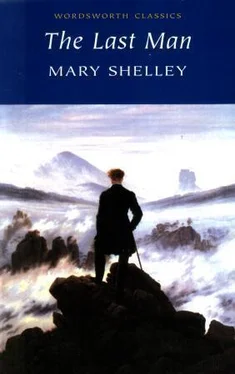Mary Shelley - The Last Man
Здесь есть возможность читать онлайн «Mary Shelley - The Last Man» весь текст электронной книги совершенно бесплатно (целиком полную версию без сокращений). В некоторых случаях можно слушать аудио, скачать через торрент в формате fb2 и присутствует краткое содержание. Год выпуска: 1826, Жанр: sf_postapocalyptic, на английском языке. Описание произведения, (предисловие) а так же отзывы посетителей доступны на портале библиотеки ЛибКат.
- Название:The Last Man
- Автор:
- Жанр:
- Год:1826
- ISBN:нет данных
- Рейтинг книги:3 / 5. Голосов: 1
-
Избранное:Добавить в избранное
- Отзывы:
-
Ваша оценка:
- 60
- 1
- 2
- 3
- 4
- 5
The Last Man: краткое содержание, описание и аннотация
Предлагаем к чтению аннотацию, описание, краткое содержание или предисловие (зависит от того, что написал сам автор книги «The Last Man»). Если вы не нашли необходимую информацию о книге — напишите в комментариях, мы постараемся отыскать её.
is Mary Shelley’s most important novel after
. With intriguing portraits of Percy Bysshe Shelley and Lord Byron, the novel offers a vision of the future that expresses a reaction against Romanticism, and demonstrates the failure of the imagination and of art to redeem the doomed characters.
From Publishers Weekly
Set in an apocalyptic future ending in the year 2100, Shelley’s 1826 novel concerns a plague that destroys almost all of humankind.
The Last Man — читать онлайн бесплатно полную книгу (весь текст) целиком
Ниже представлен текст книги, разбитый по страницам. Система сохранения места последней прочитанной страницы, позволяет с удобством читать онлайн бесплатно книгу «The Last Man», без необходимости каждый раз заново искать на чём Вы остановились. Поставьте закладку, и сможете в любой момент перейти на страницу, на которой закончили чтение.
Интервал:
Закладка:
“Pardon me, Verney, I pain you, but I will no longer complain. Now I am myself again, or rather I am better than myself. You have known how from my childhood aspiring thoughts and high desires have warred with inherent disease and overstrained sensitiveness, till the latter became victors. You know how I placed this wasted feeble hand on the abandoned helm of human government. I have been visited at times by intervals of fluctuation; yet, until now, I have felt as if a superior and indefatigable spirit had taken up its abode within me or rather incorporated itself with my weaker being. The holy visitant has for a time slept, perhaps to show me how powerless I am without its inspiration. Yet, stay for a while, O Power of goodness and strength; disdain not yet this rent shrine of fleshly mortality, O immortal Capability! While one fellow creature remains to whom aid can be afforded, stay by and prop your shattered, falling engine!”
His vehemence, and voice broken by irrepressible sighs, sunk to my heart; his eyes gleamed in the gloom of night like two earthly stars; and, his form dilating, his countenance beaming, truly it almost seemed as if at his eloquent appeal a more than mortal spirit entered his frame, exalting him above humanity.
He turned quickly towards me, and held out his hand. “Farewell, Verney,” he cried, “brother of my love, farewell; no other weak expression must cross these lips, I am alive again: to our tasks, to our combats with our unvanquishable foe, for to the last I will struggle against her.”
He grasped my hand, and bent a look on me, more fervent and animated than any smile; then turning his horse’s head, he touched the animal with the spur, and was out of sight in a moment.
A man last night had died of the plague. The quiver was not emptied, nor the bow unstrung. We stood as marks, while Parthian Pestilence aimed and shot, insatiated by conquest, unobstructed by the heaps of slain. A sickness of the soul, contagious even to my physical mechanism, came over me. My knees knocked together, my teeth chattered, the current of my blood, clotted by sudden cold, painfully forced its way from my heavy heart. I did not fear for myself, but it was misery to think that we could not even save this remnant. That those I loved might in a few days be as clay-cold as Idris in her antique tomb; nor could strength of body or energy of mind ward off the blow. A sense of degradation came over me. Did God create man, merely in the end to become dead earth in the midst of healthful vegetating nature? Was he of no more account to his Maker, than a field of corn blighted in the ear? Were our proud dreams thus to fade? Our name was written “a little lower than the angels;” and, behold, we were no better than ephemera. We had called ourselves the “paragon of animals,” and, lo! we were a “quint-essence of dust.” We repined that the pyramids had outlasted the embalmed body of their builder. Alas! the mere shepherd’s hut of straw we passed on the road, contained in its structure the principle of greater longevity than the whole race of man. How reconcile this sad change to our past aspirations, to our apparent powers!
Sudden an internal voice, articulate and clear, seemed to say:—Thus from eternity, it was decreed: the steeds that bear Time onwards had this hour and this fulfilment enchained to them, since the void brought forth its burthen. Would you read backwards the unchangeable laws of Necessity?
Mother of the world! Servant of the Omnipotent! eternal, changeless Necessity! who with busy fingers sittest ever weaving the indissoluble chain of events!—I will not murmur at thy acts. If my human mind cannot acknowledge that all that is, is right; yet since what is, must be, I will sit amidst the ruins and smile. Truly we were not born to enjoy, but to submit, and to hope.
Will not the reader tire, if I should minutely describe our long-drawn journey from Paris to Geneva? If, day by day, I should record, in the form of a journal, the thronging miseries of our lot, could my hand write, or language afford words to express, the variety of our woe; the hustling and crowding of one deplorable event upon another? Patience, oh reader! whoever thou art, wherever thou dwellest, whether of race spiritual, or, sprung from some surviving pair, thy nature will be human, thy habitation the earth; thou wilt here read of the acts of the extinct race, and wilt ask wonderingly, if they, who suffered what thou findest recorded, were of frail flesh and soft organization like thyself. Most true, they were—weep therefore; for surely, solitary being, thou wilt be of gentle disposition; shed compassionate tears; but the while lend thy attention to the tale, and learn the deeds and sufferings of thy predecessors.
Yet the last events that marked our progress through France were so full of strange horror and gloomy misery, that I dare not pause too long in the narration. If I were to dissect each incident, every small fragment of a second would contain an harrowing tale, whose minutest word would curdle the blood in thy young veins. It is right that I should erect for thy instruction this monument of the foregone race; but not that I should drag thee through the wards of an hospital, nor the secret chambers of the charnel-house. This tale, therefore, shall be rapidly unfolded. Images of destruction, pictures of despair, the procession of the last triumph of death, shall be drawn before thee, swift as the rack driven by the north wind along the blotted splendour of the sky.
Weed-grown fields, desolate towns, the wild approach of riderless horses had now become habitual to my eyes; nay, sights far worse, of the unburied dead, and human forms which were strewed on the road side, and on the steps of once frequented habitations, where,
Through the flesh that wastes away
Beneath the parching sun, the whitening bones
Start forth, and moulder in the sable dust. [23] Elton’s Translation of Hesiod’s Shield of Hercules .
Sights like these had become—ah, woe the while! so familiar, that we had ceased to shudder, or spur our stung horses to sudden speed, as we passed them. France in its best days, at least that part of France through which we travelled, had been a cultivated desert, and the absence of enclosures, of cottages, and even of peasantry, was saddening to a traveller from sunny Italy, or busy England. Yet the towns were frequent and lively, and the cordial politeness and ready smile of the wooden-shoed peasant restored good humour to the splenetic. Now, the old woman sat no more at the door with her distaff—the lank beggar no longer asked charity in courtier-like phrase; nor on holidays did the peasantry thread with slow grace the mazes of the dance. Silence, melancholy bride of death, went in procession with him from town to town through the spacious region.
We arrived at Fontainebleau, and speedily prepared for the reception of our friends. On mustering our numbers for the night, three were found missing. When I enquired for them, the man to whom I spoke, uttered the word “plague,” and fell at my feet in convulsions; he also was infected. There were hard faces around me; for among my troop were sailors who had crossed the line times unnumbered, soldiers who, in Russia and far America, had suffered famine, cold and danger, and men still sterner-featured, once nightly depredators in our over-grown metropolis; men bred from their cradle to see the whole machine of society at work for their destruction. I looked round, and saw upon the faces of all horror and despair written in glaring characters.
We passed four days at Fontainebleau. Several sickened and died, and in the mean time neither Adrian nor any of our friends appeared. My own troop was in commotion; to reach Switzerland, to plunge into rivers of snow, and to dwell in caves of ice, became the mad desire of all. Yet we had promised to wait for the Earl; and he came not. My people demanded to be led forward—rebellion, if so we might call what was the mere casting away of straw-formed shackles, appeared manifestly among them. They would away on the word without a leader. The only chance of safety, the only hope of preservation from every form of indescribable suffering, was our keeping together. I told them this; while the most determined among them answered with sullenness, that they could take care of themselves, and replied to my entreaties with scoffs and menaces.
Читать дальшеИнтервал:
Закладка:
Похожие книги на «The Last Man»
Представляем Вашему вниманию похожие книги на «The Last Man» списком для выбора. Мы отобрали схожую по названию и смыслу литературу в надежде предоставить читателям больше вариантов отыскать новые, интересные, ещё непрочитанные произведения.
Обсуждение, отзывы о книге «The Last Man» и просто собственные мнения читателей. Оставьте ваши комментарии, напишите, что Вы думаете о произведении, его смысле или главных героях. Укажите что конкретно понравилось, а что нет, и почему Вы так считаете.












